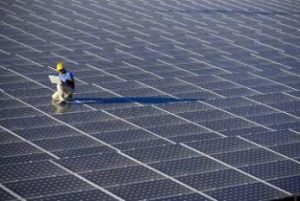As India focuses on promoting ‘Aatmanirbhar Bharat’ and reducing imports from China, the solar sector may not witness a repeat of Rs 2.36 per unit tariff discovered recently unless and until the country achieves scales, experts said. The tariff discovered in the recently concluded tranche IX auction for inter-state transmission systems (ISTS),by Solar Energy Corporation of India is lower at Rs 2.36 per unit than the tariff of Rs 2.44 per unit discovered in May 2017.

“The tariffs discovered in this bid are purely on the back of import of solar components from China. Since the bids were tendered before the call for Aatmanirbhar Bharat, it was clear that bidder can import modules and whatever required duties will be paid on import they shall be given a pass through. As a result, we see such lower tariffs being quoted,” All India Solar Industries Association Chairman Hitesh Doshi told .
He further noted that since pass through of duties is not given to developers if they buy solar modules from domestic manufacturers, India will not be able to see such lower tariffs in future unless the manufacturing improves at the scale which China has managed to increase its production.
“At such lower tariffs, the project will not be financially viable,” Doshi added.
Modules, which form 60 per cent of the total project cost of a solar project, almost 85-90 per cent are imported from China. Besides these, other equipment are also imported largely from China.
To protect domestic manufacturers, the government in 2018 imposed safeguard duty on imported modules which is about to expire in July 2020 and is now likely to impose basic customs duty (BCD) from August 1, 2020 onwards.
According to experts, while the Aatmanirbhar Bharat, is a step in the right direction, the government will have to choose between lower tariffs and energy security through made in India to make the sector sustainable.
“Anything made in China is super affordable by everybody. Unfortunately, our country has not been able to come anywhere close to what China produces at a price point which is super competitive.
“The initiatives like safeguard duty and now basic customs duty are in the right direction but the manufacturing has not improved to the scale to keep up with the paramount quality, quantity and price that we get from China sometimes at a cheaper rate than what the vendors here in India provide,” Suntuity Renewable Energy India Director of Operations Imaan Javan said.
According to rating agency ICRA, lower tariff is driven by a fall in the global solar module prices caused by the lull in demand owing to the COVID-19 pandemic which coupled with other factors could impact viability of solar tariffs as these are critically dependent on PV module price level and rupee-dollar exchange rate, besides the availability of long tenure debt at a cost competitive rate.
“The viability aspect of these lower tariffs remains extremely crucial, given the possibility of trade restrictions with China in the near-term which could impact the module availability at competitive prices. Also, a timely pass-through of increase in project cost due to imposition of basic customs duty, if any, on the imported modules remains critical, given that the notification of such duty is still not in place,” Icra Group Head and Senior Vice President Sabyasachi Majumdar said.
Icra further noted that the sourcing of solar PV modules for under-construction solar projects as well as procurement of raw materials for domestic solar module manufacturing OEMs, especially from China could be a challenge, given the backdrop of increasing geo-political risks between India and China.
“In such a scenario, the cost of import of such modules and components from alternate destinations including that of sourcing from the domestic module manufacturers, remains a key monitorable from the viability perspective for the under-construction solar projects in the near to medium term,” Icra Sector Head and Vice President Girishkumar Kadam said.






